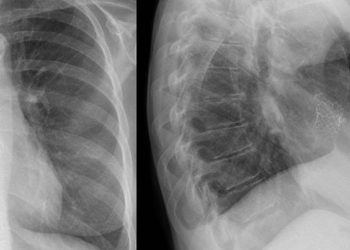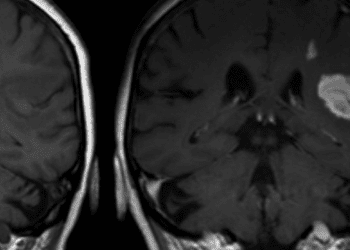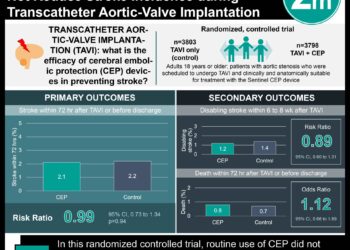Global longitudinal strain outperforms ejection fraction in detecting small vessel disease
Image: PD
1. Among patients with no history of strokes or cardiac events, abnormal left ventricular global longitudinal strain (GLS) correlated with silent cerebral infarcts (SBI) and white matter hyperintensities (WMH).
2. Differences in left ventricular ejection fraction (LVEF) were not differentiators for these subtle signs of cerebrovascular disease.
Evidence Rating Level: 2 (Good)
Study Rundown: LVEF is often normal for patients with subclinical cardiac disease whereas measuring GLS offers finer distinctions in cardiac function. For subclinical brain damage, SBI and WMH are findings detected by MRI recently shown to increase future risk of stroke, cognitive impairment, and dementia. This prospective study showed abnormalities in GLS were associated with a higher incidence of SBI and WMH, suggesting more detailed characterization of cardiac function may alert clinicians to early cerebrovascular disease.
Click to read the study in Circulation
Relevant Reading: Contribution of cerebrovascular disease in autopsy confirmed neurodegenerative disease cases in the National Alzheimer’s Coordinating Centre
In-Depth [prospective cohort]: This study of 439 participants concurrently assessed GLS by echocardiography and SBI by magnetic resonance imaging. 53 patients showed SBI, among whom GLS was significantly lower than the general study population (p<0.01). WMH were also more prevalent among patients with abnormal GLS (p<0.001). These differences persisted after adjusting for cardiovascular covariate risk factors. LVEF did not show statistically significant variation among patients with SBI or WMH.
By Gina Siddiqui and Allen Ho
More from this author: African Americans, obese overrepresented young heart failure cases,Bariatric surgery restores small artery protection, reduces inflammation, Surgical learning curve: factors in minimally invasive mitral valve surgery, Tissue obtained during heart surgery elucidates autophagy changes during ischemia, Cardiac surgery risk stratification scores correlate poorly with costs
© 2013 2minutemedicine.com. All rights reserved. No works may be reproduced without expressed written consent from 2minutemedicine.com. Disclaimer: We present factual information directly from peer reviewed medical journals. No post should be construed as medical advice and is not intended as such by the authors, editors, staff or by 2minutemedicine.com. PLEASE SEE A HEALTHCARE PROVIDER IN YOUR AREA IF YOU SEEK MEDICAL ADVICE OF ANY SORT.







